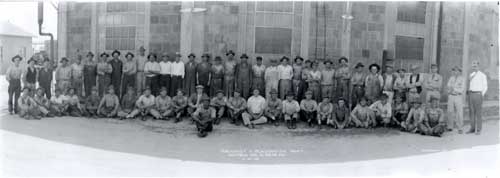 |
| We’re Sticking by Our Union: The Battle for Baytown |
The book Unions Before the Bar by Elias Lieberman is a good history of the organized labor movement in the United States. The book begins with an account of Philadelphia shoe makers who attempted to unite to demand an increased price for their piece-work done on behalf of sellers of shoes. Instead of succeeding in obtaining a higher price, they were met with an indictment for a conspiracy to restrain trade, convicted and almost sent to prison.
Labor versus management in the United States was a one-sided fight favoring management–not by a little, but overwhelmingly. This lasted until the advent of the Wagner Act passed by the United States Congress, which for the first time legally gave the laboring people of the United States somewhat of an equal footing to bargain for better wages and working conditions. Even after the Wagner Act, workers were faced with goon squads whose agenda was to destroy picket lines throughout the United States. Some workers fared even worse--such as in the Ludlow Massacre, wherein coal miners in Colorado were machine gunned by the state militia at the behest of the Rockefeller interest which owned the mines.
Labor Day should be a day to remember history. Hourly workers who today enjoy excellent retirement benefits, medical care, fair wages and a fairly safe workplace owe a lot to those who struggled to establish those benefits through organized labor. Even workers in non-union plants such as DuPont owe a lot to organized labor. DuPont’s strategy over the years has been to stay one step ahead of unionized plants in order to avoid unionization of their companies.
It is somewhat disheartening to see middle-class laboring folks who have obviously forgotten the efforts of working class of people who came before them. Multi-billionaires such as the Koch brothers have bankrolled successful efforts in state legislatures and even Congress to make it harder to make claims for industrial injuries, job discrimination, fair pay for female workers, and access to the courthouse for legitimate injuries. Too many laboring people who are enjoying the benefits brought about by historic sacrifices are too ready to cast their lot with country-club, conservative politicians who kowtow to the corporate line which is calculated to march labor back into the dark ages.
This Labor Day celebrate by remembering the US history of labor and labor unions.
Editor's note: For an article on Texas labor organizations, see The Handbook of Texas Online.